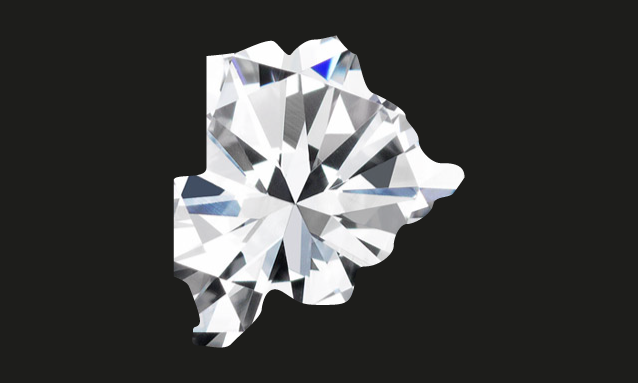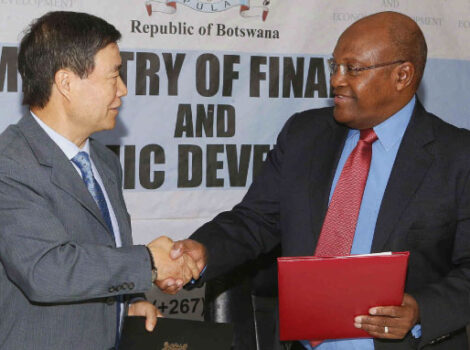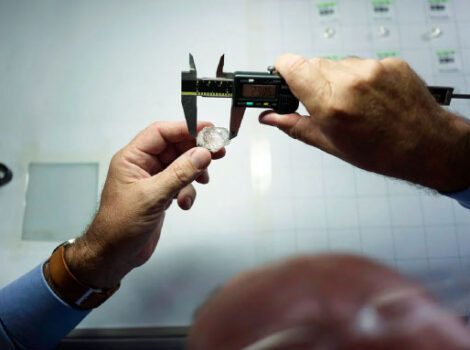
19 February 2025
The diamond industry’s most important sales agreement is almost done.
De Beers and the Botswana government have concluded their negotiations over a new sales agreement for rough diamonds after more than five years of discussions. They haven’t signed yet: Bogolo Kenewendo, the African country’s minister of minerals and energy, said she hoped this would happen later this month — a pronouncement De Beers CEO Al Cook met with a nod at a press briefing on February 3. All that remains is the “largely formulaic” process of issuing the mining licenses, Cook told the audience.
The new government, under President Duma Boko’s Umbrella for Democratic Change (UDC) coalition, has touted the fact that it managed to seal the deal in 100 days. But why did it take so long under the old government and so little time under the current one?
100-day wonder
The Botswana Democratic Party (BDP), which lost the national election in October, released a statement on February 5 that came across as somewhat bitter. It claimed the De Beers deal was a “testament to the strategic vision, commitment, and expertise of the BDP-led government,” which had been in power for almost 60 years and negotiated the agreement for all but the previous 100 days. But nestled in that text were a few important sentences hinting at what might have been preventing a final consensus for so long.
Former President Mokgweetsi Masisi’s party asked whether Boko’s government had “waived the tax that De Beers has been owing Botswana,” on what terms, and whether “it” (presumably the waiver) totalled BWP 4 billion (about $290 million), BWP 7 billion ($508 million), BWP 10 billion ($725 million) or BWP 14 billion ($1.02 billion).
“Under the BDP-led government, all key commercial terms were agreed upon in principle, and the only outstanding issue was the payment of this significant tax amount,” the statement continued.
“It is our view that if the UDC administration has indeed waived these taxes, it would have made a reckless decision that deprives Batswana [the people of Botswana] of critical funds that could have been used to improve healthcare, education, and infrastructure as well as create jobs.”
Unresolved matter
The tax issue has been going on for years. In 2021, a confidential report by the Botswana Unified Revenue Service (BURS) claimed De Beers owed the state BWP 4 billion after optimizing its structure to lower its tax liability in the African country, according to local media. Botswana’s president’s office ordered BURS to write off the bill after the miner refused to sign the sales deal, according to another report in January 2023. It’s unclear when and whether this happened and why President Masisi and his party changed their stance toward the idea of a waiver, as appears to be the case.
BDP’s assertions indicate the matter was still unresolved as of Masisi’s departure. The former president had faced criticism for gaining political points from the tough negotiations.
“The tax issue has been hanging for a couple of years and not getting anywhere,” a source in Botswana told Rapaport News on condition of anonymity, speculating too that the parties had reached a settlement.
“Masisi was using it as a stick to beat De Beers with. It was likely to end up in court, which could have delayed the new agreement for ages.”
Reasons and rumours
The new government has not spoken publicly about any settlement and did not respond to a request for comment from Rapaport News.
“In line with the principles outlined in our board-approved tax strategy, we take a responsible approach to the management of taxes, supporting the principles of transparency and active and constructive engagement with our stakeholders,” a De Beers spokesperson said.
The previous contract between De Beers and the government was supposed to expire at the end of 2020 but has seen repeated extensions. A range of official and unofficial reasons have emerged for why the parties had not closed the deal, from COVID-19 to wranglings over how much production state rough trader Okavango Diamond Company (ODC) would receive.
The real reason might have been a simple three-letter word.
Source: https://shorturl.at/QnFBU



